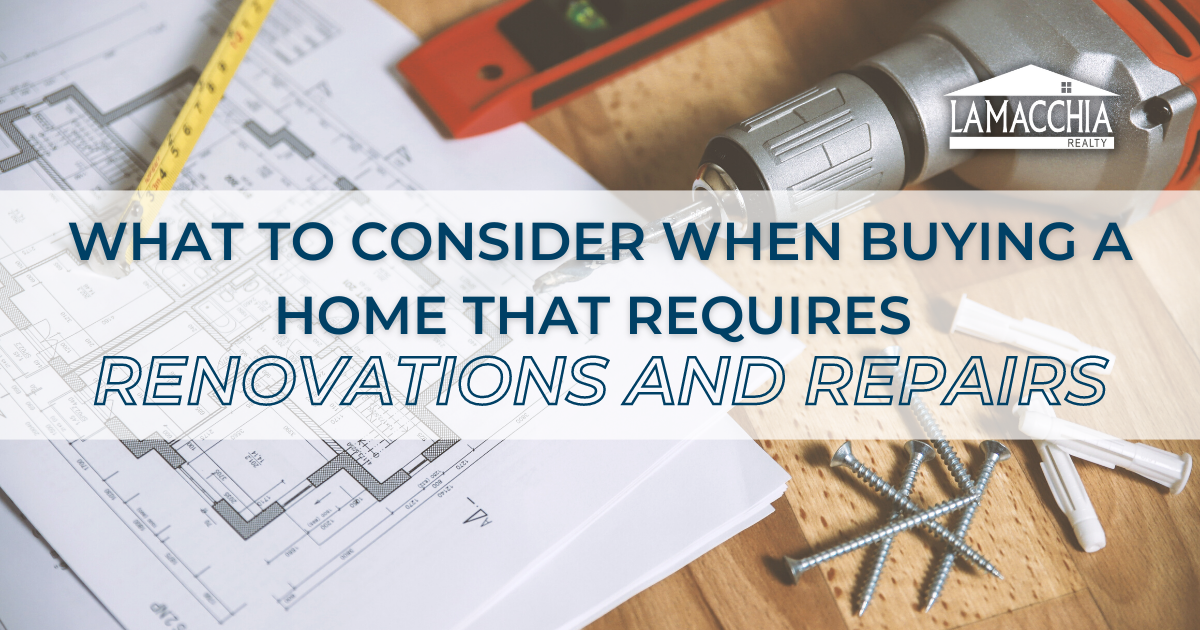
When buyers are in the process of finding their perfect home, they often realize that finding a home that checks all of the boxes, has a great layout, and is aesthetically pleasing is easier said than done, especially if they’re first-time homebuyers on a budget. Because of this, many buyers going through the home buying process are becoming more open to a house that needs renovations. Homes that need updates and repairs usually sell for less per square foot than homes that are turnkey. Purchasing a home that requires renovations and repairs might seem overwhelming, but with these tips, the process of purchasing a fixer-upper and making those first repairs is much more manageable.
Match the House to Your Skills and Budget
When it comes to purchasing a home that needs renovations, upgrades, and repairs, it’s important to make an informed decision before making an offer. Working with a realtor who has experience working with fixer-upper purchases is your first and most important step! Then it’s time to consider your skills, schedule, and your plans for financing any improvements and hire a professional contractor to provide you with an estimate for the projects you will be undertaking. Whether the home just needs a spruce up or more involved renovations, knowing what’s involved is important.
Once you decide which renovations and repairs to make, it’s also important to remember to get the proper permits. If you decide to sell the home in the future, not having permits may turn buyers away as it makes them think the project may not have been done correctly or that the renovation is a safety risk. When in doubt, get your permits.
Get the Right Type of Mortgage
Buying a home that needs renovations takes a bit more than if you were to purchase a move-in-ready home. You will need money for the down payment, closing costs, and your monthly mortgage payment, as well as money to cover the costs of home repairs and renovations.
With renovation loans, you’re able to finance a house and improvements over a longer period of time at a lower interest rate. Some renovation loan options include:
- Assumable Mortgage: An assumable mortgage is a mortgage that allows a buyer to purchase a home and assume a seller’s existing low-rate mortgage rate.
- Adjustable-Rate Mortgage: An adjustable-rate mortgage (ARM) is a home loan with a variable interest rate. This means that the rate will adjust over time based on what’s happening in the market. This can be a great option for buyers looking to only spend a few years in the home, but build equity by making home improvements.
- FHA 203(k): Offered through the Federal Housing Administration (FHA), 203(k) loans offer more lenient qualification requirements versus other renovation loans. They’re also a great way to pay for home improvements and expand your home-buying options, especially in higher-cost areas.
- VA Renovation Loan: VA loans allow thousands of veterans and military members to become homeowners each year. VA renovation loans are an option for veteran and military members to purchase a home and roll the cost of improvements into their mortgage.
- HomeStyle: Guaranteed by Fannie Mae, this type of mortgage requires a higher credit score but covers almost any improvement, even “luxury” ones such as installing a pool or upgrading exterior landscaping.
Pros & Cons of Purchasing a Fixer-Upper
Just like anything, there are pros and cons of purchasing a fixer-upper that should always be considered. Some of these include:
Pros
- Creative leeway to build, renovate, and design a house the way you want it to look.
- You decide where you spend your money.
- You have the opportunity to increase the home’s value.
- Homes that require renovations, repairs, and upgrades cost less.
Cons
- Renovations, repairs, and upgrades are time-consuming.
- You have to expect the unexpected. Initial budgets and timeframes can be exceeded.
- If you decide on excessive renovations, you will be living in a construction zone or will need to live somewhere else for the time being.
Creating a Home that is Uniquely Yours
Purchasing a home that requires renovations, upgrades, and repairs is more work than purchasing one that is move-in ready, but the effort you put into your home is well worth the reward. With the creative leeway of the updates you are making, you can create a space that is uniquely yours that includes personal features versus remnants of past owners’ lives.
